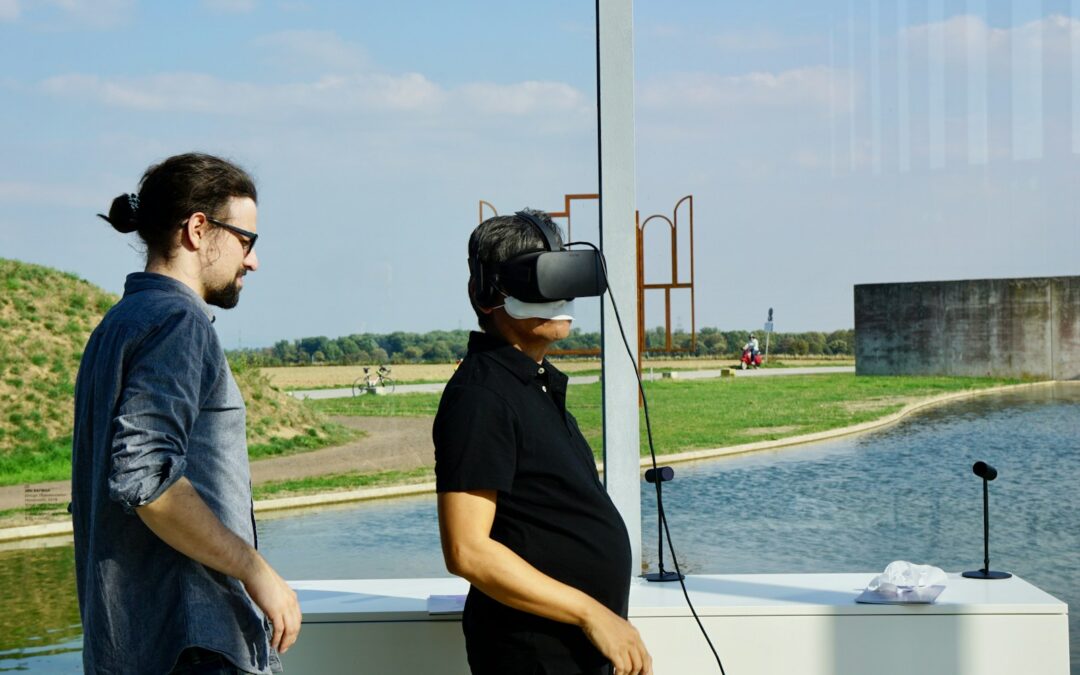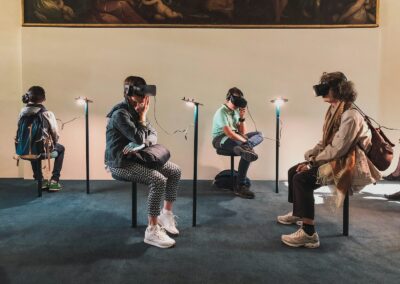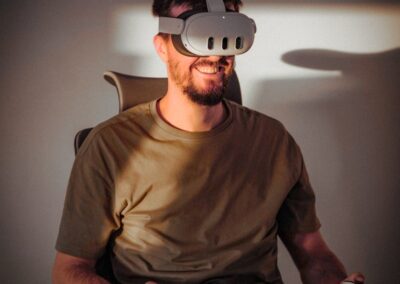Exploring the Boundaries of Reality and Perception
Understanding Virtual Environments and Sensory Simulation
The philosophical implications of virtual environments that simulate sensory experiences are profound, as these technologies challenge our traditional understanding of reality and perception. Virtual reality (VR) and augmented reality (AR) technologies are advancing rapidly, allowing users to experience environments that are increasingly indistinguishable from the real world. This evolution presents unique opportunities and challenges, especially for business executives, mid-level managers, and entrepreneurs in tech-savvy regions like Saudi Arabia and the UAE.
Virtual environments utilize advanced technologies to create immersive experiences that engage multiple senses, including sight, sound, and touch. By simulating sensory experiences, these environments can transport users to entirely new worlds, offering unprecedented possibilities for education, entertainment, and professional training. For instance, in Riyadh and Dubai, VR is being used to enhance learning experiences in schools and training programs in various industries, providing interactive and engaging ways to acquire new skills.
However, the ability to create convincing sensory simulations raises several philosophical questions. One primary concern is the nature of reality itself. When virtual experiences become indistinguishable from physical ones, it challenges our understanding of what is real. This blurring of boundaries can lead to existential questions about the nature of our experiences and the reality we inhabit. Business leaders and innovators must consider these implications as they develop and deploy VR technologies, ensuring that users remain grounded in their physical realities while exploring virtual ones.
Moreover, the ethical considerations surrounding virtual environments are significant. The power to create highly immersive and convincing simulations can be used for both beneficial and potentially harmful purposes. For example, while VR can be used to provide therapeutic experiences for mental health treatment, it could also be exploited for manipulative or deceptive practices. Establishing ethical guidelines for the development and use of virtual environments is crucial for protecting users and maintaining public trust in these technologies.
The Philosophical Dimensions of Sensory Experience
The philosophical implications of virtual environments extend to the very nature of sensory experience and perception. Our senses are the primary means through which we interact with and understand the world around us. By simulating sensory experiences, VR technologies can alter our perceptions, raising questions about the reliability and authenticity of these experiences.
One philosophical dimension to consider is the concept of “phenomenal consciousness,” which refers to the subjective experience of being aware. Virtual environments can create experiences that feel real to the user, but these experiences are fundamentally different from those in the physical world. This distinction prompts questions about the nature of consciousness and how it is influenced by artificial environments. In tech-forward cities like Riyadh and Dubai, where VR is integrated into daily life, understanding these philosophical dimensions is essential for creating meaningful and responsible virtual experiences.
Another important consideration is the impact of virtual environments on personal identity and self-perception. As users spend more time in virtual worlds, they may begin to develop identities that are distinct from their physical selves. This phenomenon, often referred to as “digital dualism,” can lead to changes in how individuals perceive themselves and interact with others. Business executives and managers must be aware of these implications as they design and implement VR applications, ensuring that they promote positive and healthy self-perception.
Furthermore, the use of VR to simulate sensory experiences can influence our understanding of space and time. Virtual environments can manipulate spatial and temporal dimensions in ways that are not possible in the physical world. This capability can be used to create educational and training experiences that are both immersive and transformative. However, it also raises questions about the nature of these experiences and their impact on our perception of reality. In regions like Saudi Arabia and the UAE, where technological innovation is rapidly advancing, exploring these philosophical dimensions is crucial for responsible and ethical development.
Leadership and Management in the Age of Virtual Environments
Effective leadership and management are essential for navigating the philosophical implications of virtual environments. Business executives, mid-level managers, and entrepreneurs must prioritize ethical responsibility and philosophical awareness within their organizations. This involves fostering a culture of critical thinking, ensuring compliance with ethical guidelines, and implementing robust management practices that consider the broader implications of VR technologies.
Leadership skills such as strategic planning, ethical decision-making, and change management are crucial for addressing the complexities of virtual environments. Managers must develop comprehensive strategies that integrate philosophical considerations into every stage of VR development and deployment. This includes conducting ethical impact assessments, setting measurable goals for ethical compliance, and regularly reviewing and updating practices to address emerging challenges.
Collaboration and stakeholder engagement are also important aspects of effective leadership in the age of virtual environments. Business leaders must work closely with technologists, ethicists, and community organizations to develop and implement best practices for VR technologies. This involves participating in industry forums, sharing knowledge and insights, and advocating for policies and regulations that promote responsible and ethical use of virtual environments. In tech-savvy regions like Riyadh and Dubai, fostering such partnerships can significantly enhance the ethical and philosophical dimensions of VR development.
Promoting Business Success Through Philosophical Awareness
Adhering to ethical guidelines in the development and use of virtual environments can significantly enhance business success. By prioritizing philosophical awareness and ethical responsibility, organizations can build a reputation for integrity and innovation, attracting customers, investors, and partners who value ethical practices. In competitive markets like Riyadh and Dubai, demonstrating a commitment to ethical VR development can differentiate businesses and strengthen their brand reputation.
Philosophical awareness also drives innovation and creativity. By considering the broader implications of virtual environments, organizations can discover new ways to create meaningful and transformative experiences. This approach can lead to improved user engagement, enhanced operational efficiency, and increased competitiveness. Business executives and entrepreneurs must recognize the strategic value of philosophical awareness and leverage it to drive innovation and growth.
Furthermore, promoting ethical and philosophical awareness aligns with broader societal goals and contributes to the long-term well-being of communities. By ensuring that virtual environments are developed and used responsibly, organizations can contribute to the advancement of technology in a manner that benefits all members of society. This alignment with societal values can enhance organizational resilience and foster positive relationships with stakeholders. Business leaders in Saudi Arabia and the UAE should prioritize philosophical awareness as part of their corporate social responsibility initiatives and strategic objectives.
Conclusion: Building an Ethical Future with Virtual Environments
The philosophical implications of virtual environments that simulate sensory experiences present significant challenges, but they can be effectively managed through the implementation of comprehensive ethical guidelines and robust regulatory measures. By prioritizing ethical responsibility, promoting transparency and public engagement, and adopting advanced monitoring mechanisms, organizations can ensure that their virtual environments are ethical and responsible. In regions like Saudi Arabia and the UAE, where technological advancements are rapidly transforming society, addressing these philosophical implications is essential for maintaining public trust and fostering sustainable growth.
In conclusion, effective leadership and strategic management are crucial for navigating the complexities of virtual environments and their philosophical implications. By integrating philosophical considerations into every stage of VR development and fostering a culture of ethical awareness, business leaders can create a future where virtual environments enhance human experiences while respecting ethical principles. As we continue to embrace technological innovations, prioritizing philosophical awareness will be key to building a resilient and ethical digital ecosystem.
—
#PhilosophicalImplications #VirtualEnvironments #SensoryExperiences #EthicalGuidelines #TechnologyRegulations #ArtificialIntelligence #Blockchain #TheMetaverse #GenerativeAI #ModernTechnology #BusinessSuccess #Leadership #ManagementSkills #ProjectManagement #SaudiArabia #UAE #Riyadh #Dubai























